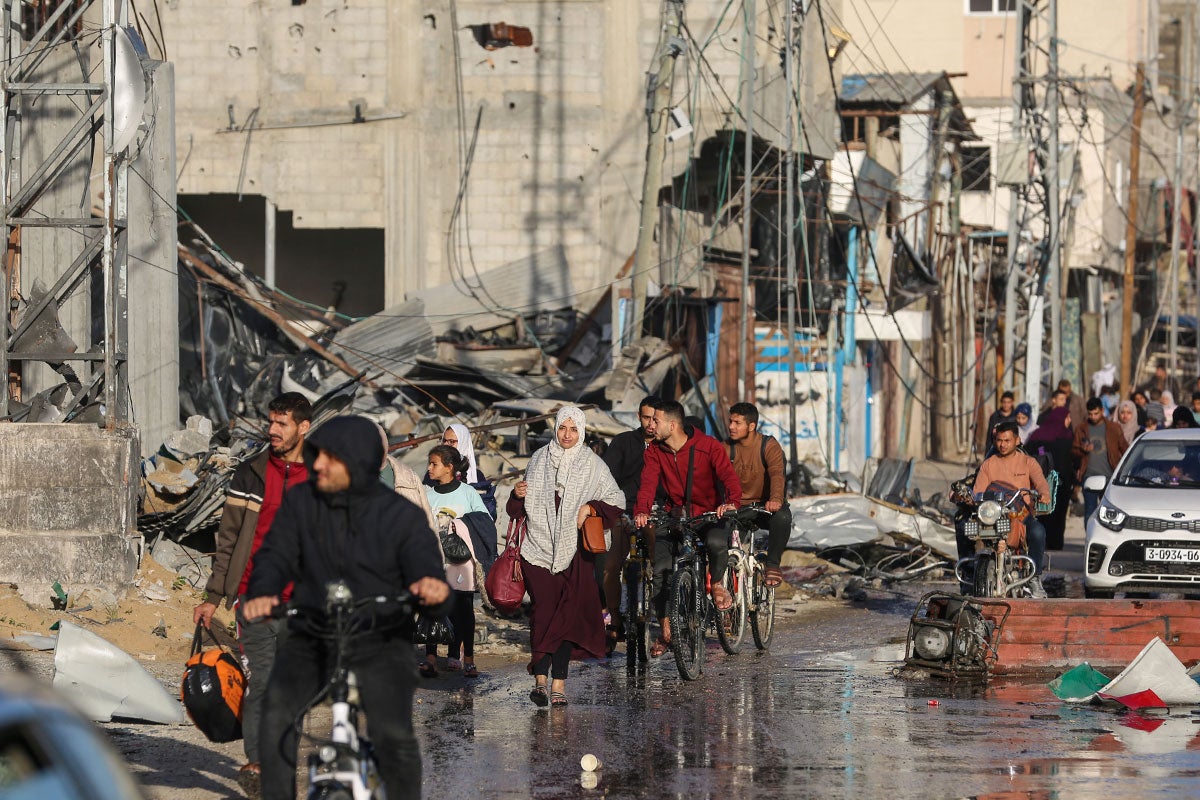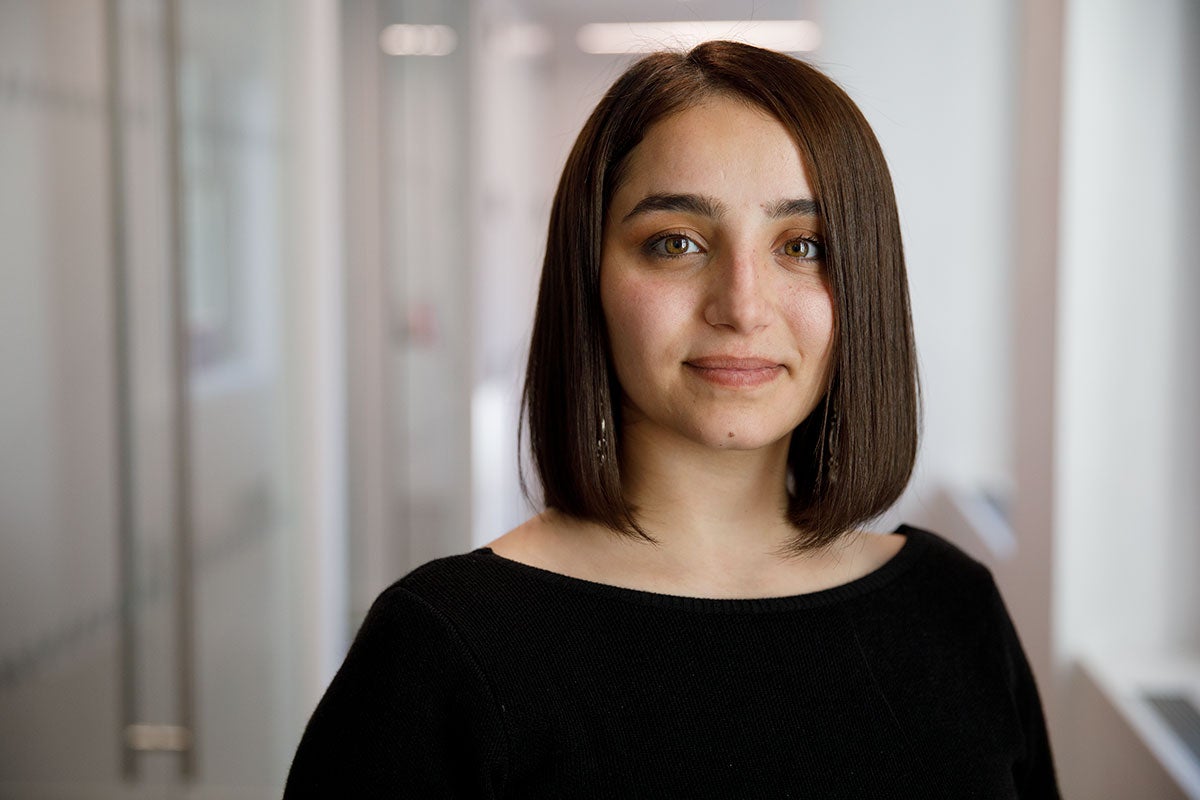“We need real action”—Palestinian women speak of hope and resilience amid the horrors of war in Gaza
Three Palestinian women speak about how the war in Gaza has impacted women’s lives, amid an unfolding famine and calls for an immediate ceasefire.
Life in Gaza is unrecognizable today, amid growing calls to end the war and to implement the latest UN Security Council Resolution, demanding an immediate ceasefire in Gaza, the immediate and unconditional release of all hostages, and safe and unimpeded access for humanitarian aid.
Today, more than a million people are experiencing a human-made disaster, with catastrophic hunger and shortage of water, sanitation, shelter, and medicine, as the world’s leading experts on food insecurity warn of “imminent” famine in northern Gaza. The UN cannot deliver humanitarian aid anywhere close to the scale needed while Gaza is under heavy bombardment by Israeli forces and humanitarian access is limited.
Every day the war in Gaza continues, at the current rate, an average of 63 women are killed.

Life in Gaza before the war
Shahd Sataria, a human rights defender with the Palestinian Working Women Society for Development (PWWSD) in the West Bank, remembers a Gaza from her childhood that has been destroyed by the war.
Sataria was born and raised in the West Bank, but her mother is from the Jabalia Camp in Gaza. Until 2004, she visited Gaza every summer.
“The last time I was in Gaza, I was nine years old,” said Sataria. Since then, it was difficult for the family to get a permit to visit Gaza. “It’s been a struggle all my life and part of my identity.”
“In Gaza, you got to visit the sea,” recalled Sataria. “We are big families. We would gather at my grandma’s house, and sleep on old mattresses [on the floor]… those were great nights.”
Sataria remembers playing with her cousins, jumping from her grandmother’s make-shift yard into her uncle’s house next door. She remembers the plants, the deep blue sea, nights full of stories, and a lot of singing. In the morning, the women of the family would gather around her grandmother, chatting.
Six months into the war, women and girls in #Gaza have almost no access to water, food, health care, and much more.
— UN Women (@UN_Women) April 3, 2024
Here's what 3 women had to say about what has been lost.
https://t.co/q4F0JYjCSx pic.twitter.com/CZRDSYJQms
What UN Women is doing in Gaza
Sataria couldn’t see her grandmother before she died. She didn’t have a permit to visit Gaza.
“Women have lost their chance to have education, to be in decision-making, and to be empowered,” she said. “They have also lost healthcare services, and those trying to do IVF [in vitro fertilization to get pregnant] lost their chances halfway.”
“I don’t see streets. I don’t see schools and universities… I don’t see women having time to take care of themselves. They lost their small talks.” - Shahd Sataria
Women have also lost privacy in crowded shelters, and access to safe spaces when they experience violence.
PWWSD, an implementing partner for UN Women, provides psychosocial support, cash assistance, and other services for women and youth. Since the 7 October 2023 Hamas attack on Israel, followed by the Israeli Armed Forces’ strikes on Gaza, UN Women has reached almost 100,000 women and their families with food, blankets, winter clothes, hygiene products and sanitary kits.
UN Women also supports Palestinian women's organizations that remain active actors to influence and participate in the humanitarian response and leads the national gender coordination efforts to make sure that the needs and rights of women and girls are integrated into the emergency response.
Gaza's road to recovery: Navigating the challenges of reconstruction
Over 70 per cent of civilian infrastructure of Gaza – including homes, hospitals, schools, water and sanitation facilities – have been destroyed or severely damaged.
Mayadah Tarazi, working with the YWCA Palestine, wonders how many years, or decades, it will take to rebuild Gaza. “It will take time for reconstructing and rebuilding Gaza… This is the worst war.” Gazans are waiting to go back, but their homes, businesses, and services lie under the rubble.
“[Living in] the West Bank and Jerusalem is not easy,” added Tarazi. “Crossing the checkpoints every single day is not easy.” She said the growing restrictions and checkpoints have made distances longer and providing services harder.

Gaza’s catastrophic humanitarian crisis
Everyone is hungry in Gaza. More than half of all Palestinians there – 1.1 million people – have completely exhausted their food supplies. Hunger hits women differently – nearly 9 in 10 women are finding it harder to access food than men, according to UN Women data.
“Hunger is killing a lot of people in Gaza, especially in the north” – Rana Khalil
Tarazi has family members in Gaza, sheltering in a church. “The food is very limited. They have no food, no flour,” she said. When they get some flour and can bake bread over coals, the family eats that for two days.
Rana Khalil, a project coordinator for PWWSD, based in the West Bank, finds it hard to eat these days. “I am most worried that hunger is killing a lot of people in Gaza, especially in the north,” she said.
Khalil too has family members and roots in Gaza, most of them are displaced and struggling to find enough food or water.
Khalil shared how women in Gaza cannot meet their simplest or the most basic needs that we take for granted: “Taking a shower. Going to the bathroom. Eating well. Listening to music… Having [sanitary] pads… Changing their clothes…” Read more about the hunger and water crisis in Gaza.
“The hope is for a ceasefire now. We keep calling for ceasefire, but we need real action.” – Mayadah Tarazi
Hope amid adversity
Despite the horror of death, destruction and starvation, Palestinian women speak of hope.
“I believe that people in Gaza are resilient. If the war would end today or tomorrow, I believe that they will rise up,” said Sataria.
“The hope is for a ceasefire now. We keep calling for ceasefire, but we need real action. We need the support from the governments to really push for the ceasefire, because it can't continue like this,” said Tarazi.
“We believe in the United Nations, and we believe that people are with us,” added Khalil.









